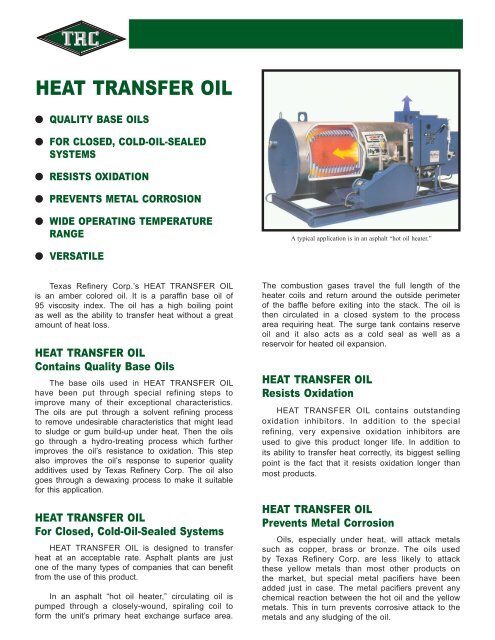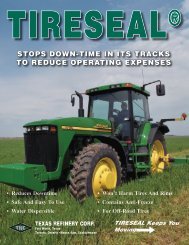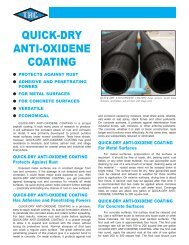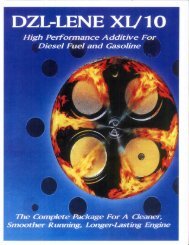HEAT TRANSFER OIL - Texas Refinery Corp
HEAT TRANSFER OIL - Texas Refinery Corp
HEAT TRANSFER OIL - Texas Refinery Corp
Create successful ePaper yourself
Turn your PDF publications into a flip-book with our unique Google optimized e-Paper software.
<strong>HEAT</strong> <strong>TRANSFER</strong> <strong>OIL</strong><br />
QUALITY BASE <strong>OIL</strong>S<br />
FOR CLOSED, COLD-<strong>OIL</strong>-SEALED<br />
SYSTEMS<br />
RESISTS OXIDATION<br />
PREVENTS METAL CORROSION<br />
WIDE OPERATING TEMPERATURE<br />
RANGE<br />
VERSATILE<br />
<strong>Texas</strong> <strong>Refinery</strong> <strong>Corp</strong>.’s <strong>HEAT</strong> <strong>TRANSFER</strong> <strong>OIL</strong><br />
is an amber colored oil. It is a paraffin base oil of<br />
95 viscosity index. The oil has a high boiling point<br />
as well as the ability to transfer heat without a great<br />
amount of heat loss.<br />
<strong>HEAT</strong> <strong>TRANSFER</strong> <strong>OIL</strong><br />
Contains Quality Base Oils<br />
The base oils used in <strong>HEAT</strong> <strong>TRANSFER</strong> <strong>OIL</strong><br />
have been put through special refining steps to<br />
improve many of their exceptional characteristics.<br />
The oils are put through a solvent refining process<br />
to remove undesirable characteristics that might lead<br />
to sludge or gum build-up under heat. Then the oils<br />
go through a hydro-treating process which further<br />
improves the oil’s resistance to oxidation. This step<br />
also improves the oil’s response to superior quality<br />
additives used by <strong>Texas</strong> <strong>Refinery</strong> <strong>Corp</strong>. The oil also<br />
goes through a dewaxing process to make it suitable<br />
for this application.<br />
<strong>HEAT</strong> <strong>TRANSFER</strong> <strong>OIL</strong><br />
For Closed, Cold-Oil-Sealed Systems<br />
<strong>HEAT</strong> <strong>TRANSFER</strong> <strong>OIL</strong> is designed to transfer<br />
heat at an acceptable rate. Asphalt plants are just<br />
one of the many types of companies that can benefit<br />
from the use of this product.<br />
In an asphalt “hot oil heater,” circulating oil is<br />
pumped through a closely-wound, spiraling coil to<br />
form the unit’s primary heat exchange surface area.<br />
A typical application is in an asphalt “hot oil heater.”<br />
The combustion gases travel the full length of the<br />
heater coils and return around the outside perimeter<br />
of the baffle before exiting into the stack. The oil is<br />
then circulated in a closed system to the process<br />
area requiring heat. The surge tank contains reserve<br />
oil and it also acts as a cold seal as well as a<br />
reservoir for heated oil expansion.<br />
<strong>HEAT</strong> <strong>TRANSFER</strong> <strong>OIL</strong><br />
Resists Oxidation<br />
<strong>HEAT</strong> <strong>TRANSFER</strong> <strong>OIL</strong> contains outstanding<br />
oxidation inhibitors. In addition to the special<br />
refining, very expensive oxidation inhibitors are<br />
used to give this product longer life. In addition to<br />
its ability to transfer heat correctly, its biggest selling<br />
point is the fact that it resists oxidation longer than<br />
most products.<br />
<strong>HEAT</strong> <strong>TRANSFER</strong> <strong>OIL</strong><br />
Prevents Metal Corrosion<br />
Oils, especially under heat, will attack metals<br />
such as copper, brass or bronze. The oils used<br />
by <strong>Texas</strong> <strong>Refinery</strong> <strong>Corp</strong>. are less likely to attack<br />
these yellow metals than most other products on<br />
the market, but special metal pacifiers have been<br />
added just in case. The metal pacifiers prevent any<br />
chemical reaction between the hot oil and the yellow<br />
metals. This in turn prevents corrosive attack to the<br />
metals and any sludging of the oil.
<strong>HEAT</strong> <strong>TRANSFER</strong> <strong>OIL</strong><br />
Wide Operating Temperature Range<br />
<strong>HEAT</strong> <strong>TRANSFER</strong> <strong>OIL</strong> is a high VI paraffin oil.<br />
It is safe to use up to 520 0 F. in a closed system<br />
and where minimum shutdown temperatures are not<br />
below 20 0 F. With its higher specific heat and thermal<br />
conductivity at all temperatures, it provides more<br />
rapid heating and greater flexibility in a system. It<br />
can be used with great efficiency where high heat<br />
transfer rates or high flow rates at reasonably low<br />
temperatures are desired.<br />
<strong>HEAT</strong> <strong>TRANSFER</strong> <strong>OIL</strong><br />
Is Versatile<br />
SPECIFICATIONS<br />
<strong>HEAT</strong> <strong>TRANSFER</strong> <strong>OIL</strong><br />
Businesses that have need for this type of<br />
oil include, but are not limited to, heat-treating<br />
companies, textile operations, carpet industries,<br />
asphalt companies and a wide variety of other<br />
companies that use an oil capable of withstanding<br />
high heat and resisting oxidation.<br />
#6128 #6121<br />
ISO 68 ISO 100<br />
Gravity, 0 API 29/31 29/31<br />
Specific Gravity 0.87 0.87<br />
Flash Point, 0 F., COC, (Typ.) 450 490<br />
Fire Point, 0 F., COC, (Typ.) 480 520<br />
Pour Point, 0 F., Max. -5 0<br />
Viscosity @ 100 0 C., cSt 8.5 12.0<br />
Viscosity @ 40 0 C., cSt 68 100<br />
Viscosity Index, Min. 95 95<br />
Foam Test, After Initial Blowing:<br />
5 Min. Settling ml.<br />
Sequence I 25/0 25/0<br />
Sequence II 25/0 25/0<br />
Sequence III 25/0 25/0<br />
Conradson Carbon Residue, Wt.% 0.10 0.10<br />
Sulfated Ash, Wt. % Trace Trace<br />
Boiling Point, 0 F. 650 705<br />
Vapor Density >5 >15<br />
Vapor Pressure





